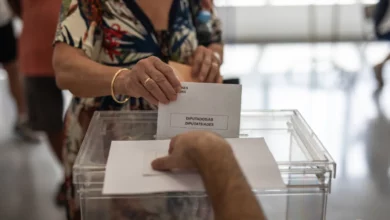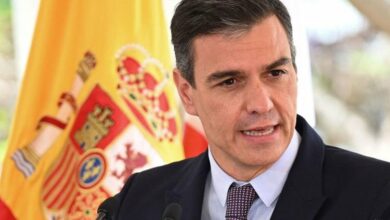Luis Javier is the director of the two branches of the Instituto Cervantes Spanish cultural centers in Egypt. He is also the institute’s former director for worldwide cultural activities. The cultural centers have two primary missions: teaching the Spanish language, and disseminating Spanish culture by organizing some 250 cultural events every year. Today, 2800 Egyptian students are learning Spanish through these Institutos Cervantes, which have had a presence in Egypt since 1931.
After participating in a seminar at the Cairo International Book Fair on the role of cultural centers, Javier sat down with Al-Masry Al-Youm to talk about 79 years of Egyptian-Spanish cultural relations.
Al-Masry Al-Youm: What is the origin of the Spanish cultural presence in Egypt?
Luis Javier: It all started with the foundation in 1931 of La Escuela Espanola del Cairo by a group of Spanish entrepreneurs, professors and intellectuals who lived in Egypt. This center, which owes its very existence to a popular initiative, was dedicated to the teaching of the Spanish language and the dissemination of Spanish culture. It was inaugurated with a great portrait signed by the Spanish King, but three months later the Republic took power in Spain and the center was nationalized. Therefore, La Escuela became an official cultural center.
In 1949, the Egyptian Institute was created in Madrid, and, in reciprocation, La Escuela changed its name to the Spanish Institute. Since this period, we have created a library, received famous Spanish authors and artists in Cairo to discuss and exhibit their work, and finally, in 1991, the actual Instituto Cervantes was founded. Today, the Spanish Center has 76 branches in 50 countries, with two centers in Egypt–one in Cairo, the other in Alexandria. In the region, we have centers in Morocco, Algeria, Tunisia, Egypt, Israel, Jordan, Syria, Lebanon and Turkey.
Al-Masry: Do you cooperate with the director of the Egyptian Institute in Madrid to organize cultural events?
Javier: Absolutely. The director from the Egyptian center in Madrid and I spoke, and we came to the conclusion that it made much more sense to try to launch activities together. This is something that is very easy to do because we have an open and professional institute, so we can avoid all the related diplomatic ballet.
Al-Masry: You said during the conference that the common history of Arabs and Spanish people during the period of Al-Andalus, which lasted for eight centuries, is still very palpable today. Does that facilitate cultural exchanges between these two peoples?
Javier: Our common history is something that Spanish people cannot forget. Every time I travel in the Middle East, I am considered the “distant cousin” and treated accordingly. The relationship between Spain and the Levant is somewhat easier than our relationship with Morocco, because we do not have a history of violence with countries such as Lebanon, Syria, Egypt or Jordan. In the 1960s, many Arab students from these countries got scholarships and went to Spain to study, and some of them married Spanish women and remained there.
On the other hand, many factors–both historical and actual–do not facilitate our relationship with our closest Arab neighbor, Morocco. When Franco waged a war against the Spanish Republic, he used Moroccan soldiers to terrorize and murder the population. Also, Spain still has two enclaves on Moroccan soil–Ceuta and Melilla–and of course the biggest issue is Western Sahara. But in the end, there is a shared will to know each other better because our people are very close. I also want to stress that anyone who wants to conduct a serious study on medieval Spain has to know Arabic to be able to access the ancient books
Al-Masry: Cultural centers around the world are suffering from financial problems. Have the Cervantes Institutes also been affected by the unfolding global crisis?
Javier: Of course. But still we keep growing, and some new centers are opening even though we are a small institution with a small budget compared to other centers. I recently heard on the radio that the general director of German cultural centers worldwide was wondering whether a Goethe Institute should open in New York. Is it really necessary to have an institute there when there are already so many German-language departments at the universities, and when the embassy organizes cultural activities?
I think we should focus on areas where the opportunity to learn the language is missing–in China, for example, or Russia, or Southeast Asia. It is in these regions that we have to offer a vision of Europe. The actual problem we’re dealing with isn’t to reduce costs–it’s to transform our workforce and keep asking ourselves what the mission of a cultural center is in the 21st century.




